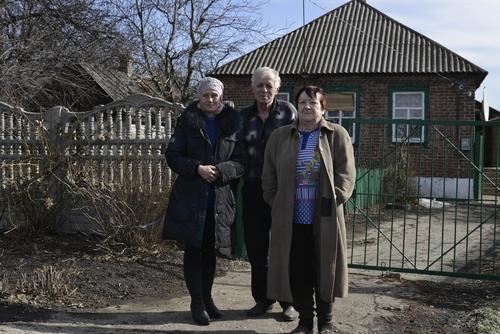Ekaterina Prokofievna, 88, remained in her house throughout the fighting because a locked knee restricts her movements. She lives alone, but a neighbor, also elderly, has been staying with her since the neighbor’s own house was destroyed and has been helping Ekaterina.
“I have arthritis and I need a walker to move around. I couldn’t run during the bombing to take shelter in the basement. I stayed here in this room. It was awful, really awful. The noise was deafening. I wanted to die. I was afraid. It was impossible to sleep. The bombing was so violent that it threw me out of bed. The entire house shook and part of the kitchen ceiling collapsed. There are only five or six people still on our street. Everyone else has left. I have headaches now.
People brought food a week ago, so there is enough to eat. And I have a coal stove in the kitchen. It does a good job of heating up the room where I’m living. Those windows weren't broken. My neighbor sealed up the other windows with plastic. I can manage like that.”
Evgeny Illitch
“My father-in-law has a swollen leg and an infected foot. You can come look at it.” The young woman points out the house to the MSF team. These health care workers are visiting patients who need urgent care in this outlying district of Debaltseve. Evgeny Illitch, a 58 year-old former miner, explains his problem. “I have a lot of pain in my foot. It’s horrible. I’ve been using an ointment for two weeks but it hasn’t helped at all.”
Seated on a bench, he shows his left foot and right leg, which is swollen with edema. Maurice, the MSF doctor, diagnoses a necrosis of the big toe, associated with lower extremity arterial disease – that is, an inflammation of the arteries. “We will have to amputate the infected toe, otherwise things could get much worse,” the doctor tells him. Illitch is relieved by the news and thanks the doctor warmly. He asks for only one thing: to be relieved of his pain.
An ambulance comes to pick him up the next morning. It was dispatched by the head physician at the Debaltseve hospital, who notified Maurice. Three or four rooms have just been rebuilt on the ground floor of one wing of the hospital. However, as everywhere else in the town, there is no electricity and the operating room is still not functioning. The head physician thus decides to transfer the patient to the hospital in Yenakievo, a town 20 kilometers away, where he can have surgery.
Anatoly Ivanovich (dementia), 74.
Lyudmila Petrovna, 66, has not moved from her Debaltseve neighborhood. Her husband, Anatoly, is completely dependent and suffers from dementia. She never considered abandoning him - not even for a single moment throughout the weeks of bombing – and never would.
“Most of the time, this elderly man does not speak,” notes Maurice, the MSF doctor who has come to examine him. “When he does, his words are incoherent and his manner is usually aggressive.”
Because of these behavioral problems, the couple remained in their house instead of going to a shelter. When the building was destroyed by shelling, leaving only the one room where they happened to be, a neighbor took them in and offered them a room.
Lyudmila’s emotional state is fragile. Maurice suggests that it might be easier for her to move her husband to a care facility in the region. She breaks down in tears and categorically refuses. “I faced the bombing,” she says. “I’m not going to abandon him now.”



